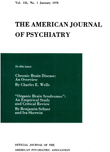VARIATIONS IN THE GLUCOSE TOLERANCE OBSERVATIONS IN SCHIZOPHRENICS BEFORE AND AFTER SHOCK TREATMENT
Abstract
1. The majority of schizophrenic patients who improved clinically, showed a significant change in their oral glucose tolerance, this change being towards the normal.
2. In the occasional case, clinical improvement did occur without any significant change in the glucose tolerance.
3. Those who did not improve or deteriorated clinically, showed no change in their abnormal tolerance or it became more abnormal.
4. This change could not be attributed to the administration of insulin per se, nor entirely to the change in absorption of the glucose in the gastro-intestinal tract.
5. The pre-treatment glucose tolerance curves in this series of schizophrenics, seem to show an abnormally prolonged period before the return to fasting levels.
Access content
To read the fulltext, please use one of the options below to sign in or purchase access.- Personal login
- Institutional Login
- Sign in via OpenAthens
- Register for access
-
Please login/register if you wish to pair your device and check access availability.
Not a subscriber?
PsychiatryOnline subscription options offer access to the DSM-5 library, books, journals, CME, and patient resources. This all-in-one virtual library provides psychiatrists and mental health professionals with key resources for diagnosis, treatment, research, and professional development.
Need more help? PsychiatryOnline Customer Service may be reached by emailing [email protected] or by calling 800-368-5777 (in the U.S.) or 703-907-7322 (outside the U.S.).



